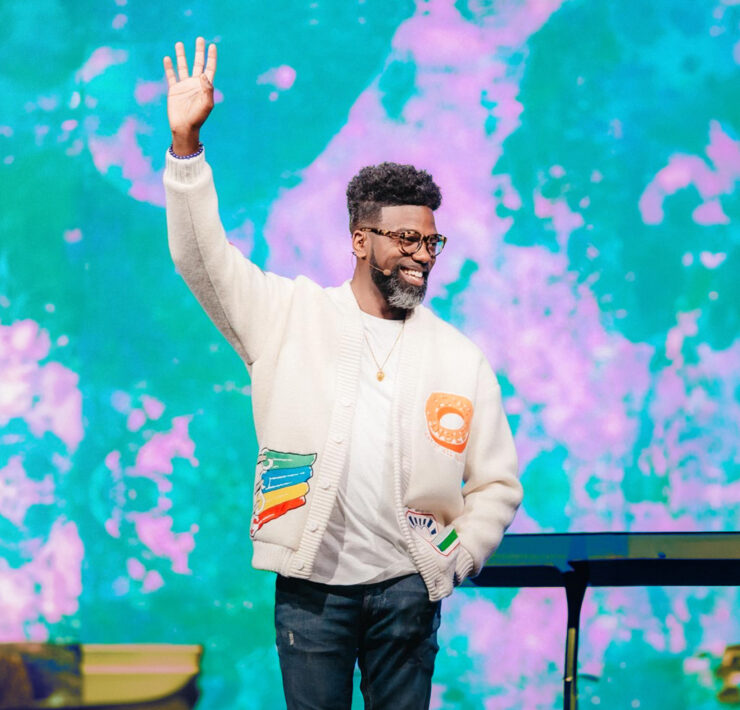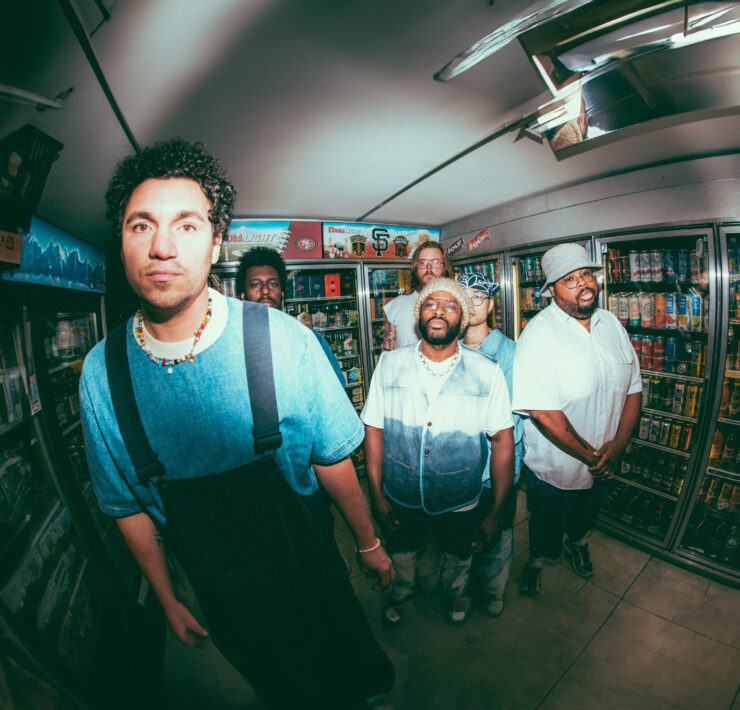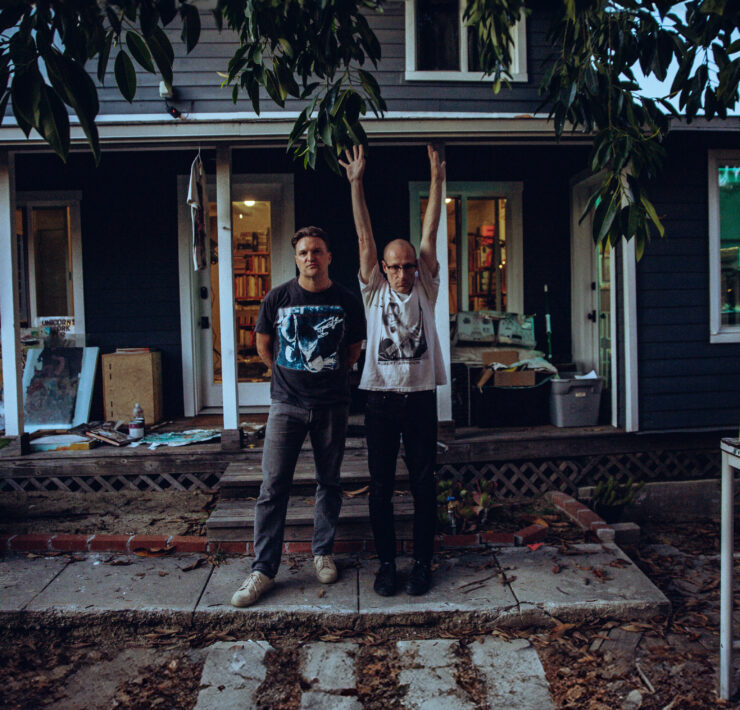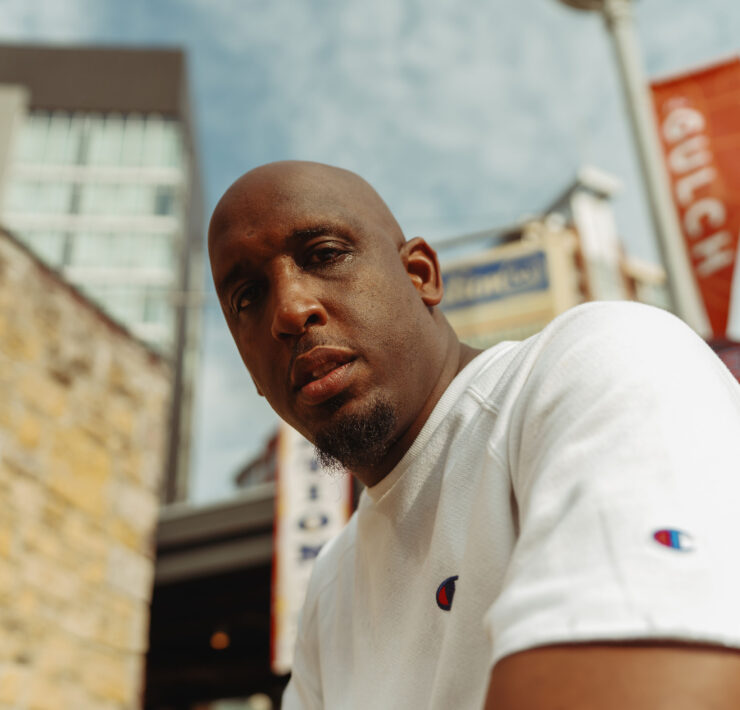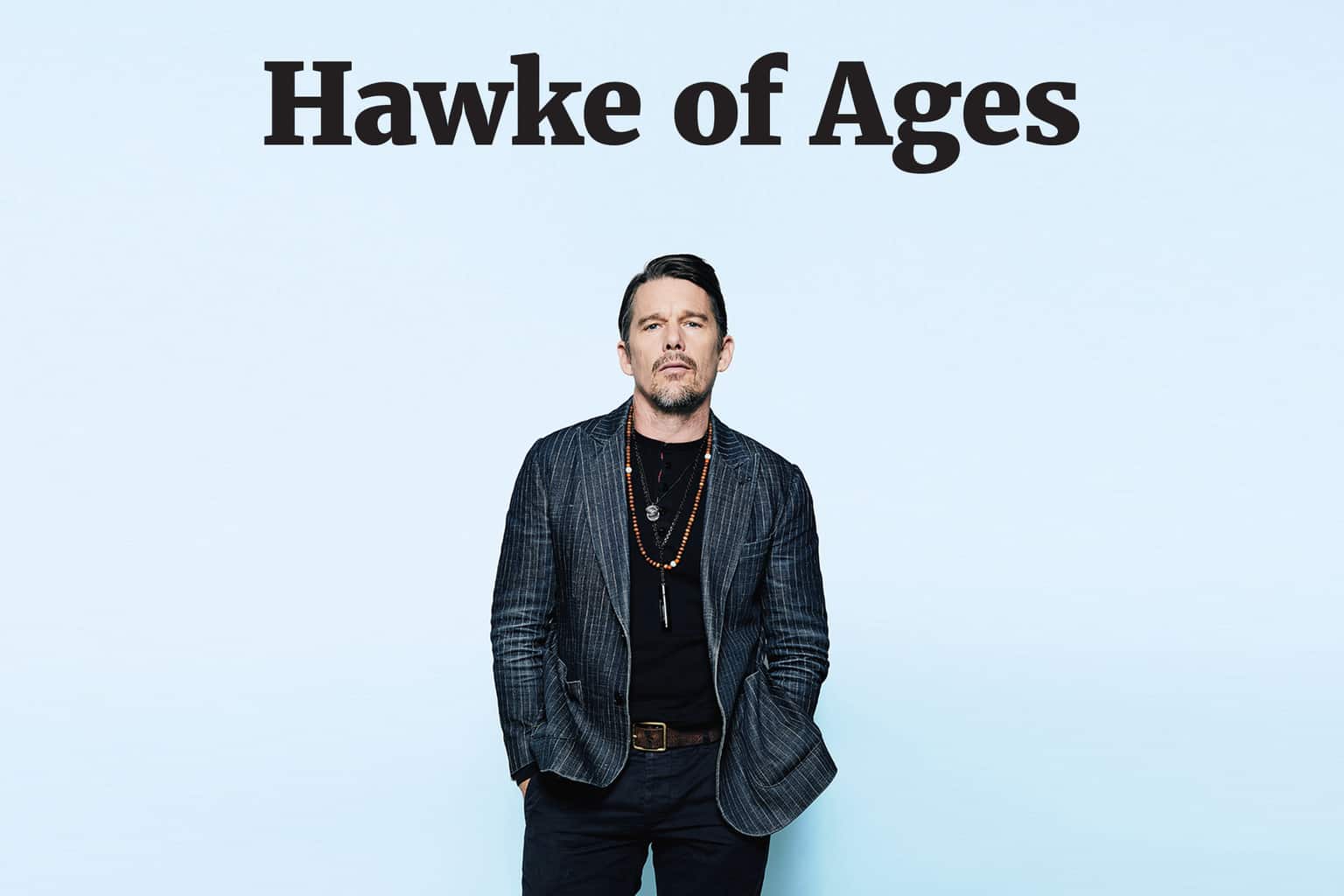
Ethan Hawke is preoccupied with three questions: why we’re born, what we’re doing here and why we have to die. They’re eternal, essential ideas. And in his latest film, the acclaimed First Reformed, Hawke is grappling with each of them. He plays a priest in an existential crisis. The role is a new page for the actor. The eager energy Hawke leaned on in Dead Poets Society and Training Day is gone. His posture is weary, and it shelters a desperation that pays off in jaw-dropping fashion.
Critics are calling Reformed, directed by Raging Bull and Taxi Driver’s Paul Schrader, one of the year’s best movies— and Hawke shoulders almost the entire thing. As his strain becomes evident, the viewer is forced to ask the same questions as the character. There’s a lot behind Hawke’s performance: the actor’s own formative church upbringing, a deep-rooted artistic philosophy and a lifetime of occupying other people’s minds.
“My life has chapters in a way other people’s don’t,” Hawke says. “It’s a [nomadic] lifestyle. For years, one thing that’s been consistent is the non-stop change.”
For decades, Hawke has been a vessel. But after years of collecting ideas and perspectives, he’s full to the brim. It’s time for him to release something. His questions have been answered.
Chapter One: Why We’re Born
Hawke was born in Austin, Texas, on November 6, 1970. His parents divorced when he was 5 years old, and his mother remarried when he was 11. The family moved to Princeton, New Jersey, where Hawke was baptized into the Episcopalian Church. His mom and stepfather served with the local youth group, and Hawke says he was raised a Christian. He says his religious upbringing didn’t confine his worldview. If anything, it expanded it.

“Faith is a supple and moving thing, because you see a lot of adults with different points of view,” Hawke says. “A lot of people turn off when you talk about religion because they think they’re about to be preached to or told they’re lost. My family never really did that. I grew up with a lot of different people who had very supple minds, and it made talking about why we’re born and why we’re here and why we have to die a lot more of an exciting conversation. I was raised in a dialogue of faith. I’ve always been trying to figure out how to integrate that aspect of my life into my creative life.”
Hawke’s perspective is oriented outward. He’s a searcher. He talks in a hesitant, almost meandering style, like he looks down every avenue of the conversation before choosing his path, but when he finds that path, he takes it to the end. He pauses when new things occur to him, and he interrupts follow-up questions when a new idea hits his brain. He’s a deep thinker,
and he’s curious.
His breakout role, in 1989’s Dead Poets Society, could be considered a projection of his personality. When Hawke was 18, he dropped out of Carnegie-Mellon to play the bright-eyed Todd Anderson opposite Robin Williams. It’s a stirring performance. Hawke looks younger than he really is, but he also seems desperate to grow up. He asks questions and clings to the answers with all his might.
In Poets, Hawke made himself a catalyst for viewers. When you watch it, you feel what his character feels, and you align yourself with his experience. It’s still his greatest gift as an actor.
Only his second movie, Poets could have been Hawke’s ticket to stardom (his debut, Explorers, was lauded by critics but flopped at the box office). His contemporaries—actors like Matt Damon, Edward Norton, Will Smith and Mark Wahlberg—were still years from making their marks in Hollywood, and Hawke had a chance to be famous—really famous.
I was raised in a dialogue of faith. I’ve always been trying to figure out how to integrate that aspect of my life into my creative life.
But instead of chasing the limelight, Hawke started chasing art. Reality Bites arrived in 1994 as a Generation X manifesto. 1997’s Gattaca, an artistic science-fiction film, wrestled with questions about destiny and identity. Hawke was a star but a minor one. He opted for the emblematic parts instead of the blockbusters. That church dialogue he had started when he was younger still played out in his head, and it shaped the first steps of his career.
“One of the great things about going to church is you see yourself as a member of a community,” he says. “I think it gave me a great framework to survive the pitfalls of early celebrity. It teaches a fundamental humility. One of the problems of making it in the arts is how it fans the flames of your ego. It’s really easy for young people to lose context. You need a sense of humility to keep learning and keep growing.” In acting, Hawke found his purpose. This is what he was born to do.
Chapter Two: What We’re Doing Here
In 2001, Hawke appeared alongside Denzel Washington in the crooked-cop thriller Training Day. Washington would take home the Academy Award for best actor, but Hawke’s role as the meek, fidgety, deer-in-the-headlights rookie Jake Hoyt earned him an Oscar nomination, too (he has four total now).
It’s the perfect Ethan Hawke part, because as much as Jake Hoyt is a character, Jake Hoyt is a vessel. Once again, Hawke’s feelings are the audience’s feelings. His reactions are their reactions. Washington is an unstoppable force, but Hawke fuels his momentum. It’s a bizarre, but exceptional, pairing. Training Day opened at No. 1 its first weekend.
“Sometimes you make a great movie and nobody sees it, but sometimes you make a great movie and everyone sees it,” Hawke says. “It’s an awesome feeling to connect with an audience. It’s like a painting. You see inside somebody’s eyes and realize they probably feel a lot of the same things you feel.”
Across theater and film, each of Hawke’s roles have left a small mark on his worldview. Some actors can shed roles like costumes. Others have a harder time extracting themselves from the character. Hawke finds a paradox in it: As much as he acknowledges the potential dangers of this dynamic, he says the better the actor, the more they’ll let the character’s motivations, perspectives and ideas “infect their psyche.”
But as Hawke grew older (and in the Before trilogy and Boyhood, the latter of which was filmed over the course of 12 years—we literally watched him grow older), he had to learn how to step back out of the characters he possessed. The roles were opening up his mind to more parts of the human experience, but he was starting to lose parts of himself.
“It takes a toll on your body,” he says. “You have to let these things pass through you. If you were to read The Bell Jar (a novel about depression and suicide) every day for a month, you’re really getting inside the head of someone who’s contemplating taking their own life. When you play Macbeth, the evil that lurks inside man’s greediness for power finds its way inside you. When you’re playing a priest in a full-blown existential crisis, looking into the void of despair, it presents challenges to your day. If you don’t let those feelings go, you’re not going to live very long.”
Silence is a tool to open up people,” he explains. “There’s a great line I remember: ‘The voice of our Creator is gentle and can only be heard in silence.’

First Reformed finds Hawke again as that deep, hollow vessel. He channels more convictions and ideas in this movie than in any other role. There’s a lot beneath the surface, but what makes the performance remarkable is how Hawke keeps it all hidden. He buries those ideas.
It’s your job as the viewer, then, to start digging. For maybe the first time in an Ethan Hawke movie, First Reformed makes you lean in.
Unlike Dead Poets Society or Training Day, there’s no room for you in Hawke’s performance. That means instead of going through the movie alongside him, you’re opposite him, even in conflict with him. And he stays back until the finale, when he charges forward, and you realize that this time he has the ideas, he has the message and he empties those ideas out upon the audience. It would feel traitorous if it wasn’t so revelatory.
“One of the things that’s happened to movies—it’s such a problem—they do all the work for us,” Hawke says. “They show a human being with a tear in their eye, and they play sad music, so you feel sad, and you don’t have to do any work. Silences leave room for your imagination. You have to ask yourself, ‘How do I feel about that? Which character is right and which character is wrong?’ It’s a little bit of work, but the impact is far greater because it’s asking you to participate.”
Hawke isn’t an empty vessel anymore. He’s here to make an audience think and feel things they could never have conceived without him. It’s his mission now, his orders. Instead of letting us participate in someone else’s worldview, he’s asking us to participate in his own.
Chapter Three: Why We Have to Die
There are lines on Ethan Hawke’s face now. They give him history, and they allude to all the roles he’s borne and shed. He looks like a veteran. He describes his life that way sometimes, like he was in battle.
“I’ve always gone to war for art,” he says. “I believe the artistic dialogue of a nation, of a people, represents its collective consciousness, how much we connect with other people, how we experience compassion. It’s part of our mental health. That’s the role of the artistic community: to provoke good conversations and interesting dialogue, to entertain us in a way that leads us somewhere. That’s always been the thing I fight for.”
Hawke has put himself on the front lines. He believes that as an actor, he can tap into those complexities. He can move people’s gaze past the exterior and toward the interior. That’s what a movie like First Reformed tries to do, but at the same time, it’s not easy to direct an audience in 2018.
First, that change asks someone used to being passive to lean in, and second, movies aren’t ideal for showing the interior, Hawke says. They’re on a flat screen. Depth, literally, has limitations.
“The spiritual life is hard to dramatize,” he says. “Issues of faith have been omnipresent in my waking life, and yet, very few of my movies are spiritual in context. Film isn’t oriented toward what makes us alive. It loves girls taking their tops off. It loves guys pulling out guns. It loves Camaros. Things that we are desirous of—alcohol, sex, love, power, money— make a tremendous amount of noise, but in silence, we often hear a more gentle voice inside ourselves.”
At its best, art has always made me feel the way I wish church did. It makes you feel like you don’t have to be ashamed. It makes you feel like you’re not alone.

It’s this silence that he believes is the key to helping people understand deeper truths. “Silence is a tool to open up people,” he explains. “There’s a great line I remember: ‘The voice of our Creator is gentle and can only be heard in silence.’”
Hawke has seen Christian movies. They represent, to him, the opposite of the broad, inclusive perspectives he experienced in church growing up. He calls them “Hallmark movies,” superstitious and superficial.
“In my mind, they don’t deal with a sincere adult relationship to the Divine,” he says. He sounds disheartened.
Perhaps to Hawke, they’re a missed opportunity. He says the culture now is quick to hyperbolize, and we do that because it’s easy. We praise celebrities in one moment, but when we find out about their personal failings, it shocks us. It’s too hard to reckon with a person’s inherent contradictions or other complicated realities, so we shuttle them toward one extreme or the other. People aren’t that simple.
“A lot of people spend their whole lives listening to the same music they listened to when they were 18 to 25,” Hawke says. “That’s placing yourself in a formaldehyde of sorts. We have to remember to keep being alive and to have an experienced life. Opening yourself up to new thoughts and new ideas is what we want to do to our children as they grow up, so they’re not provincial and they have an openness of thought. Art is one of the few things that can really be that bridge for us.”
Hawke’s spiritual foundation is strong enough to hold him up even when he looks over the edge, and he has. He’s become other people.
“I believe in the value of performance,” he says. “It brings us together. It lets us see ourselves. When art is good, it’s connected to what I would call a spiritual life. At its best, art has always made me feel the way I wish church did. It makes you feel like you don’t have to be ashamed. It makes you feel like you’re not alone.













